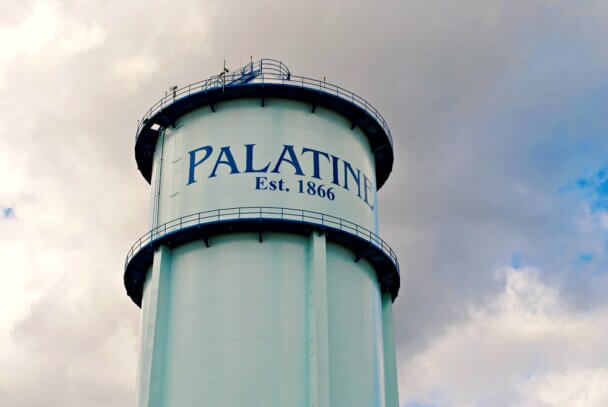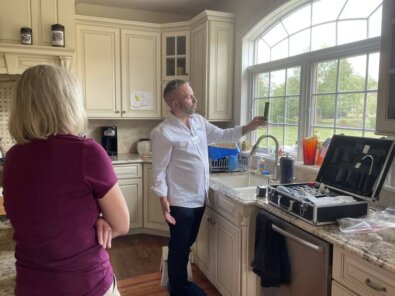Struggling with hard water in Palatine, IL? Angel Water understands the specific water challenges faced by residents here. Our high-quality water softening systems are designed to eliminate excess calcium and magnesium, providing soft, clean water for your home or business. With over 50 years of experience in the water treatment industry, we are dedicated to enhancing your water quality and ensuring your complete satisfaction. So, if you need water filtration equipment and supplies or the services that go with them, please don’t hesitate to stop in or reach out.
Water Softeners in Palatine, IL

Quick Start Guide for Solving Palatine Water Issues
- Reach Out – Call or submit a form to learn more and schedule an appointment.
- Water Testing – We’ll come to your home to test your water to understand your water problems.
- Discuss Our Findings – Learn what’s lurking in your family’s water and have your questions answered.
- Recommend Solutions – Our water expert will recommend equipment to remedy your home’s unique issues.
- Execute Your Clean Water Plan – We’ll install and maintain the water quality equipment needed to address your water issues.

Local Water Problems in Palatine, IL
Palatine is home to a close-knit community and plenty of exciting things to do. If you’re looking for an escape from the hustle and bustle of modern living, you can spend a weekend camping at Camp Reinberg or enjoy a relaxing hike in Deer Grove West. Of course, you can instead indulge in some culture by seeing a show at the Cutting Hall Performing Arts Center or spend an afternoon shopping at the Deer Park Town Center.
Unfortunately, Palatine is also home to some local water problems…
Where Does Palatine Get Its Water?
During the nineteenth and much of the twentieth century, Palatine relied on well water for their supply. In 1986, Palatine and four other cities formed the Northwest Water Commission. Essentially, the commission created a pipeline from Evanston to bring Lake Michigan water to the four cities. The change from reliance on well water to Lake Michigan water happened in 1986. It’s important to note that there are still wells in Palatine in case of emergency. Yet, these wells are susceptible to water main breaks as the age of the structures increases.
Palatine water is treated with chlorine. Occasionally, this chlorine treatment can produce its own pollutants that are hazardous to your health. So, why do it? The plant treats the water with chlorine to get it clean; however, chlorine isn’t the same as a full filtration system. Couple that with the potential that chlorine creates its own toxins, and it’s easy to see why Palatine water isn’t fully contaminant-free.
Does Palatine Have Hard Water?
Unfortunately, contamination isn’t the only problem with Palatine water. Hard water is also an issue residents must deal with.
Palatine drinking water has a hardness level of 245 parts per million or 14 grains per gallon. These numbers are considered extremely high and can cause a host of headaches for people. Some problems that might arise are:
- Dry skin
- Spots on dishes
- Discolored clothing
- Brittle hair or hair that doesn’t feel clean
- Broken appliances
Water becomes hard due to a mineral buildup in the water supply. A water softener diminishes the buildup so that the water can remain fluid and clean. So, consider getting a water softener if you’re tired of having dirty dishes or brittle hair!
What’s in the Drinking Water in Palatine?
The Environmental Protection Agency tests the city’s water supplies to determine the number of contaminants in the collection. It should be known that the pollutants in Palatine water levels don’t exceed the EPA’s guidelines. Yet, these standards haven’t been updated in nearly twenty years, so it’s time to refresh things.
For this reason, it’s wiser to look at the Environmental Working Group’s studies. The agency sets stricter guidelines than the EPA. So, more harmful contaminants can be caught. Remember, any pollution level is dangerous, whether the EPA says so or not.
| CONTAMINANT | TOTAL |
EWG RECOMMENDED
|
| Chromium (hexavalent) | 0.209ppb | 0.02ppb |
| Haloacetic Acids (HAA9) | 27.7ppb | 0.06ppb |
| Trihalomethanes (TTHM) | 33.0ppb | 0.15ppb |
Now, let’s take a closer look and what these contaminants are and why they might be harmful to your health.
Chromium (Hexavalent)
Chromium, also known as chromium-6, is a carcinogen created by industrial pollution. It’s one of the most common contaminants found in the Chicagoland area’s water supply.
Severe health problems like cancer, problems with the heart and lungs, respiratory disease, and dermatitis are linked to excessive chromium exposure. Sadly, it seems like the existence of chromium is here to stay in Palatine, IL, as the levels are high.
Haloacetic Acids
Haloacetic acids are a group of 9 disinfectants that arise when water is treated with chlorine or chloramine. The Northwest Water Commission treats its water with chlorine to get it clean. However, these acids prove there are negatives to treating water with such chemicals. So, why use it? Although there are health concerns, chlorine treatments are the most effective way to clean a water supply.
The EWG also reports totals for each acid. Three of the nine acids tested high than the EWG standards. These include:
- Dibromoacetic Acid
- Dibromochloromethane Acid
- Dichloracetic Acid
These acids are specifically harmful to infants and pregnant women. Problems include developmental delays, physical impairments, and certain types of cancer.
Total Trihalomethanes (TTHMs)
Like Haloacetic acids, trihalomethanes are created throughout the disinfection process. The group includes four health-hazardous chemicals:
- Bromodichloromethane
- Bromoform
- Chloroform
- Dibromochloromethane
Excessive amounts of TTHMs in the water supply have been linked to various cancers, including liver and kidney and bladder cancer.
Other Contaminants Detected
The EWG also found other contaminants in Palatine water. These include:
- Monobromoacetic acid
- Strontium
- Vanadium
Again, none of these other contaminants exceed the EPA’s or EWG’s guidelines, but it’s still vital to know of their existence. Multiple diseases and cancers have been linked to these toxins, and you can learn more on the EWG’s Palatine page.
Water Softener Installation in Palatine, IL
At Angel Water, we go beyond simply selling water softeners—we excel in their expert installation for our Palatine customers. Our licensed plumbers are committed to your family’s safety by adhering strictly to Illinois regulations, which ensure proper installation practices. This careful attention to detail is crucial, as improper plumbing can lead to the introduction of harmful bacteria, viruses and other contaminants into your home’s drinking water.
Water Softeners in Palatine, IL
Water softeners are available in a range of sizes and models to fit the unique needs of every home. Whether you rely on city or well water, Angel Water offers a variety of options to meet your specific needs. For our Palatine customers, we highly recommend the PurASoft ERRC3702 for its outstanding performance and reliability.
Reverse Osmosis Systems in Palatine, IL
In Palatine, our reverse osmosis systems are engineered to safeguard your home’s drinking water from harmful toxins such as mercury, cyanide, lead and hexavalent chromium. These advanced systems often feature carbon filters that enhance the taste and odor of tap water, encouraging more frequent consumption and ensuring cleaner, better-tasting water for your family.
Chlorine Injection in Palatine, IL
A chlorine injection system is highly effective in tackling issues such as unpleasant smells and sour tastes by eliminating bacteria and oxidizing toxins. This process ensures that your well water is both odor-free and healthier to use. Additionally, a chlorinator system helps protect your home’s plumbing infrastructure and supports your overall health by maintaining water quality.
Whole House Filters in Palatine, IL
Whole-house water filter systems are designed to purify every drop of water throughout your home, not just the water from your kitchen faucet. These systems effectively tackle common issues like clothes staining, chlorine odors, and metallic tastes that are often found in Palatine homes. At Angel Water, we strongly recommend these systems for their comprehensive benefits and ability to enhance the quality of water throughout your household.
Sump Pumps and Battery Backups in Palatine, IL
In Palatine, we offer sump pumps and battery backups to shield your basement from flooding and prevent water damage. Basement water damage can cause serious problems, including respiratory issues, severe allergies and foundation cracks. At Angel Water, we are committed to protecting your property and ensuring your peace of mind with these reliable protective solutions.
Water Heaters in Palatine, IL
Are you dealing with cold showers or a surprising spike in energy bills without an obvious cause? Your water heater could be the culprit. Fortunately, Angel Water provides a range of high-quality electric and gas water heaters to suit families and homes of all sizes, ensuring you find the perfect solution for your needs!
Alkaline Water in Palatine, IL
Many Palatine residents believe maintaining the body’s pH balance is crucial for overall health, as an overly acidic blood pH can lead to various health issues. To help with this, Angel Water offers an Alkaline/Remineralizing System that can be seamlessly added as an upgrade to your existing RO System. This system is designed to improve the pH balance of your water, contributing to better health outcomes for our customers.
Water Softener Maintenance in Palatine, IL
Regular maintenance of your water filtration systems is essential for ensuring continuous protection for your family and home. Maintenance tasks may include addressing common issues such as low water pressure, leaks and proper salt usage. By staying proactive with maintenance, you can extend the lifespan of your filtration systems and ensure they continue to perform effectively.
Water Testing in Palatine, IL
Do you know what might be in your family’s drinking water? The most reliable way to find out is through comprehensive water testing conducted right in your home. City water reports, which are often completed at the street level, may not fully capture contaminants that can enter your water supply between the street and your faucet. Additionally, if you rely on well water, it’s not subject to regulatory testing, making it crucial for you to personally ensure its safety.
Plumbing Services in Palatine, IL
At Angel Water, your family’s health is our top priority, which is why we rely exclusively on licensed plumbers to install and maintain your water filtration equipment in Palatine. Our certified plumbers are experts in every aspect of your filtration systems, ensuring both proper installation and ongoing maintenance. They also manage the installation and upkeep of our full range of products, including water heaters and sump pumps, offering complete care for your home’s water systems.
Why Choose Angel Water?
Expertise:
Over 50 years of experience in resolving water quality issues.
Advanced Technology:
Our water softeners use the latest technology for efficient operation.
Customer Satisfaction:
Free water analysis and customized solutions tailored to your needs.
Qualified Professionals:
IDPH Licensed Plumbers in Illinois ensure high-quality service and regulatory compliance.
Highly Rated:
Over 1,000 5-star ratings on Google demonstrate our commitment to excellent service.
Licensed Plumbing Company:
The only water softening company in Illinois that is also a licensed plumbing company.
Lifetime Warranty:
The only company offering a lifetime warranty on our ERR-3700 series filters.
A+ BBB Rating:
An A+ rating with the Better Business Bureau shows our commitment to quality service.
Learn More About Water Quality in Palatine, IL
Angel Water is dedicated to keeping our customers informed about the latest news and information surrounding local water quality, the equipment that treats it and related topics. If you want to learn more about water, check out our extensive resource library. You’ll find videos, blogs, FAQs and much more on these topics.
Water Softener Companies in Palatine, IL
Are you looking for high-quality water filtration equipment, water heaters or sump pumps and battery backups? Want to pair top-notch equipment with fantastic customer service? Call Angel Water today at (847) 382-7800 or complete the contact form below to get started! We look forward to hearing from you!
Get Started With a FREE Water Test
Just fill out the form below and we will reach out to
schedule the best time for your free water test!

